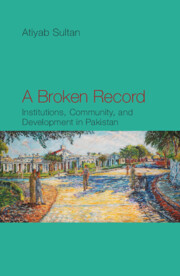Book contents
- Frontmatter
- Contents
- List of Figures
- List of Tables
- Preface
- Acknowledgements
- Introduction: Institutions, Debt, and the Deadweight of History, Punjab c. 1900–47
- 1 Glass Half Full?: Two Views of the Punjab
- 2 An Alternative Economic History of the Punjab
- 3 Combating Indebtedness I: Laws and Institutions
- 4 Combating Indebtedness II: Community Development in Colonial Punjab
- 5 The Bureaucrat’s Burden: Tales of Reform and Development
- 6 Colonialism and the Discourse on Development
- Postscript
- Glossary
- Bibliography
- Index
4 - Combating Indebtedness II: Community Development in Colonial Punjab
Published online by Cambridge University Press: 27 September 2022
- Frontmatter
- Contents
- List of Figures
- List of Tables
- Preface
- Acknowledgements
- Introduction: Institutions, Debt, and the Deadweight of History, Punjab c. 1900–47
- 1 Glass Half Full?: Two Views of the Punjab
- 2 An Alternative Economic History of the Punjab
- 3 Combating Indebtedness I: Laws and Institutions
- 4 Combating Indebtedness II: Community Development in Colonial Punjab
- 5 The Bureaucrat’s Burden: Tales of Reform and Development
- 6 Colonialism and the Discourse on Development
- Postscript
- Glossary
- Bibliography
- Index
Summary
I would like, then, to end by putting in a good word for the non-industrious poor. At least they aren't hurting anyone. Insofar as the time they are taking time off from work is being spent with friends and family, enjoying and caring for those they love, they’re probably improving the world more than we acknowledge.
—David Graeber, Debt: The First 5000 YearsBuilding on the legal architecture of reform, colonial officers championed a wide-ranging grassroots response to indebtedness. This centred around the establishment of credit cooperatives of various kinds, whose main purpose was to ‘reform’ the peasant and relieve him from the shackles of debt. The initiative tapped into many of the urges of the colonial state, including the shifting of emphasis from colonial policies as a potential cause of indebtedness (such as the onerous revenue demand), and also utilized the youthful aspirations of ‘missionary’ officers who found a painstaking purpose in reforming the habits of indolent and habitually indebted peasants. Credit cooperatives remained varied in form and definition throughout the Punjab, and this chapter unveils the different manifestations and articulations of the idea. Overall, the cooperative movement became the major policy response on the ground to indebtedness. It evaluates how the provision of credit from cooperatives had limited success and uses this ‘policy intervention’ to understand institutional failure and the nature and scope of development policy in the Punjab. It also draws close parallels with more contemporary solutions to underdevelopment, including community development programmes and the popularization of microfinance.
The Cooperative Movement in the Punjab
Large-scale peasant indebtedness was not unique to the Punjab, and the worst peasant riots and disturbances in this regard were arguably seen in the south of India in the late nineteenth and early twentieth centuries. Cooperation as a tool of economic reform was also first used in the south. In 1892, the Government of Madras appointed a senior officer, Sir Frederick Nicholson, to study agricultural banks in Europe and the possibilities of adapting them in India. Nicholson's report recommended the establishment of cooperative credit societies in India similar to German Raiffeisen societies. His report was circulated among other Indian states and in the United Provinces. H. Dupernex also wrote a book, Peoples’ Banks for Northern India, during the same period.
- Type
- Chapter
- Information
- A Broken RecordInstitutions, Community and Development in Pakistan, pp. 75 - 107Publisher: Cambridge University PressPrint publication year: 2022



